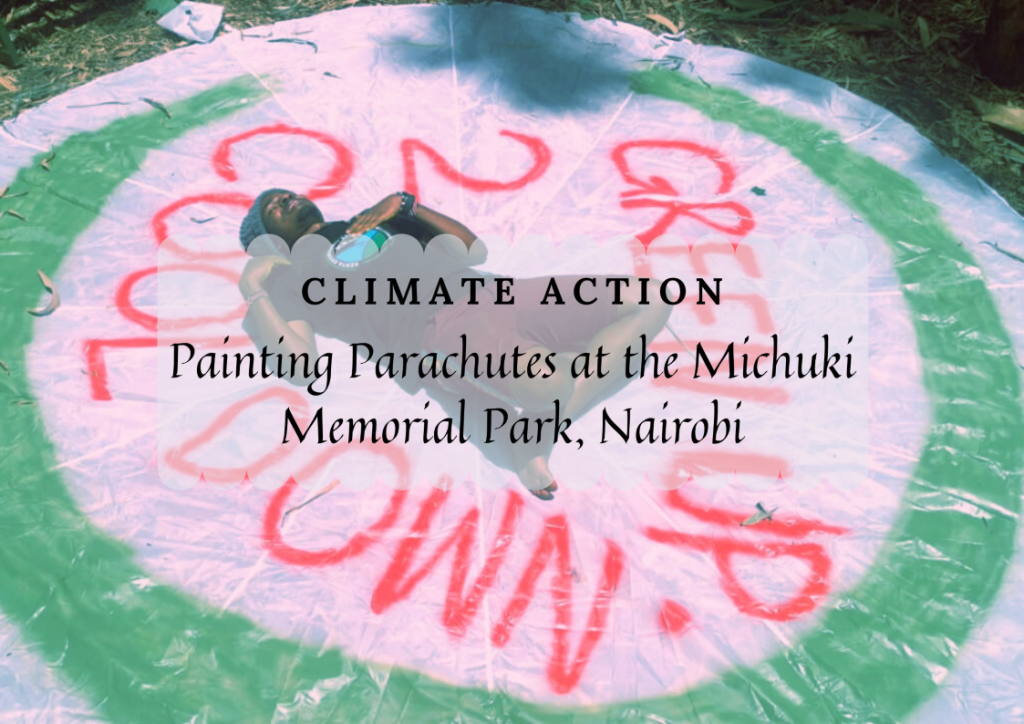- Why are you at COP27 & COY17?
I am an Environment and Community Development practitioner, and from my experience in advocacy and climate-nature nexus, I can say that climate action needs humanity to act from a united front; solidarity is the way forward. Society needs saving from itself, nature does not need saving.
I come from a village in the Arid and Semi-Arid lands of Seme Constituency, Kisumu County, Kenya. Growing up, I witnessed the quantity of the local River Awach’s water discharge, and it was a lot. The river could even uproot fully grown and mature mango trees during the rainy season due to its force. From this, the farms downstream (my village) could get silt deposited on them and thus helped in keeping the farms fertile and viable for agriculture. Over the years, the river discharge has reduced immeasurably, and my community faces chronic water shortage problems during dry seasons. This, coupled with unpredictable and unreliable weather, exposes us to food insecurity risks every season. I am here to share my community’s story and to demystify the theory that climate is not real.
Youth across the globe are already doing a lot of on-the-ground activities despite the limited resources (in finance, capacity-building tools, knowledge and access to decision-making circles). Yet, we remain marginalised, and our work is not fully recognised. I am COP27 with the Afrika Youth Caravan to COP27, and I attended the COY17 to amplify youth voices from Afrika, their challenges and the incredible work they are engaged in adapting to climate change’s effects. Under our three key messages: Resilience, Just Energy Transition and YOUth Action, we have prepared a statement with recommendations from Afrikan Youth we intend to share with the COP27 Presidency.
- What issues should be discussed?
Loss and Damage Finance
Frontline communities are facing adverse climate change impacts from floods, extreme famine and drought, food insecurity, rising sea levels and hurricanes, just to mention a few. In Afrika, where these effects are felt the most, we contribute the least ( less than four per cent of the global greenhouse gas emissions) to the causes of climate change, yet we bear the burn of its effects. The north international countries must take responsibility for their mistakes by paying climate reparations regarding loss and damage finance.
Institutionalizing Loss and Damage Finance facility. This issue was ignored at COP26 in Glasgow. Still, as a youth, I look forward to the issue being addressed in-depth, a robust and sustainable finance pot being established and the necessary mechanisms for disbursement set up. No more empty talks and promises; I demand action NOW and Climate Justice NOW.
Adaptation Financing
Continue strengthening the ability to adapt to climate careers and build resilience. As a continent and people, we have shown and proved how resilient we are over the effects of climate change, COVID-19 and poor leadership. We are not victims, we are vulnerable and marginalised, but we have much potential. If we can get the right support for adaptation finance and capacity building, we can implement restoration initiatives in our communities using Nature-based Solutions and other suitable approaches. This support must not be in the form of loans on an already debt-ridden continent, but it should be in the form of grants and other forms of sustainable finance.
Just Energy Transition
Any conversation on the energy transition from fossil fuels to renewable energy needs to centre on the needs and interests of Afrika first. COP27 needs to find a way to decentralise energy solutions with robust financial instruments and mechanisms for youth and communities at the grassroots.
COP27 must mobilise robust financial mechanisms through public-private partnerships and government institutions to invest in the energy transition while ensuring equity and access to communities and youth at the grassroots.
- What does it need for the conferences to succeed?
Meaningful engagement of youths, women, children and marginalised communities across all levels of decision-making, implementation of climate action and mobilisation of resources. In each of these conferences, youth have fought to get to the conference spaces, tell our stories as they are, tell off leaders for lack of action, and get space to showcase our solutions. COP27 has not been any different, with challenges of accreditation, accommodation and funding to get to Sharm El Sheikh.
Implementation of commitments by party members, the private sector and all stakeholders
COP27 has been dubbed the Afrikan COP and an implementation COP, it is only logical and right that global leaders share what they have implemented and their implementation plans that they can be held accountable to in case they fail and can be used as models of implementation in the event they succeed.
- So far, 26 COPs have preceded this one, and the common denominator from all of them has been ambitious commitments, inaction and inadequate action from global leaders. Committing and ratifying agreements and treaties are not enough; we need real and meaningful action from across a;l; stakeholders. We have the solutions; let us implement them and stop marking timing and repeating the same things repeatedly.
Indigenous and Traditional Knowledge Systems
Careful integration of the Afrikan indigenous and local knowledge in Restoration and other climate action is at the heart of successful adaptation initiatives. Indigenous and local knowledge differs across cultures and places and within communities based on gender, age, and other factors of social differentiation. To successfully incorporate indigenous and local knowledge in climate action planning and implementation, practitioners and policymakers should:
- Recognise the legitimacy and value of indigenous and local knowledge;
- Ensure diverse knowledge holders have an equal voice and that their strategic interests are addressed; and
- Ensure that mobilising indigenous and local knowledge generates culturally-desirable incentives and benefits to local and indigenous knowledge holders rather than being an extractive exercise


